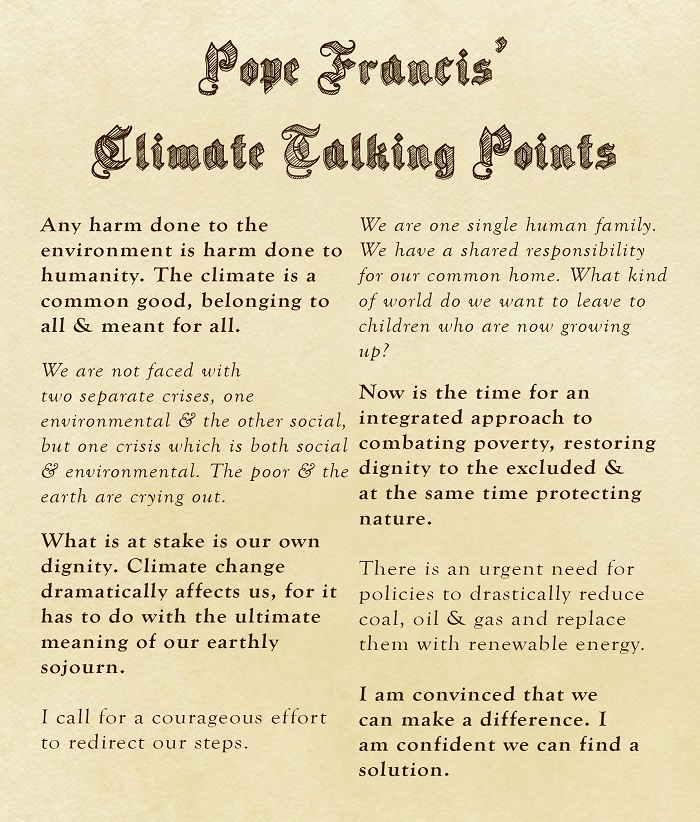Maybe you heard? Pope Francis was making the rounds last week in DC, New York, and Philly. The buzz has been hard to miss.
It’s no wonder. The Pope is the “faith boss” of every practicing Catholic on earth: 1.2 billion Roman Catholics worldwide and at least 70 million Catholics in the US—that’s the largest denomination by far, 22 percent of the American population. (Interestingly, the second-largest US “faith” group is former Catholics.)
But it’s not just his flock that’s paying attention these days; the crowd-pleasing Pope has mostly everybody’s ear. And he’s talking about climate change—a lot.
Environmental protection—or creation care—is based on long-standing Catholic teaching, as old as Genesis, grounded in the New Testament, and reflected in the life of the Pope Francis’ chosen namesake, St. Francis of Assisi, protector of the poor and patron saint of the environment. The last two Popes, both considered very conservative in many ways, were solid environmentalists in both word and deed. But Pope Francis is taking on climate change specifically, he’s talking about it in powerful new ways, and he’s going to great lengths to deliver his message far beyond the Catholic Church.
Earlier this year, Pope Francis issued an encyclical that defines Church doctrine about climate change. Unlike other encyclicals which are official papal letters directed only to all bishops, Francis addressed this one to “all people of good will in the world.” Yep, it’s a letter to the whole world. And he’s been busy driving the message home. You could say he’s lobbying for God—and on behalf of “the least of these”-–urging action on climate as world leaders prepare to meet yet again to discuss an international agreement in Paris later this fall.
So, how is Pope Francis reshaping the conversation about climate change?
- For one, Pope Francis walks the talk, living simply and humbly, rejecting material trappings, connecting with “regular” people…driving in a tiny Fiat. He is the Pope, so whatever he says naturally carries enormous moral authority. But living by example gives his words extra heft.
- He’s denounced consumerism, greed, and waste, and critiqued capitalism. Pope Francis doesn’t mince his words: Economic systems that uphold profit over human and natural well-being are sinful.
- Perhaps as a signal to other faith leaders, Pope Francis takes special care to dismantle the false dichotomy between science and faith. In Catholic teaching, the natural world is a gift from God and science is one way of understanding and honoring that gift. Faith and science are complementary ways of coming to know the complexity of Creation.
- He’s updating the conventional understanding of human dominion over nature to one of interconnectedness. Pope Francis stresses that we cannot separate people and planet, the world’s poor from our treatment of “our common home.” If one is destroyed, so is the other. If one is protected and cared for, it will uphold the other. And people are interconnected too, across the globe and within the global economy.
- Perhaps most importantly, Pope Francis connects environmental destruction with global poverty and wealth inequality, squarely framing climate action as an urgent social justice matter and a top priority for people of faith.
- Pope Francis balances a message of urgency about the climate crisis with hope and optimism about our ability to work together and find solutions.
- And he doesn’t seem to mind getting political. He has applauded specific climate policy efforts. In his encyclical and in his addresses to Congress and the United Nations, Pope Francis elevated the need for cooperation and underscored the role of government and the calling of elected officials to find solutions for the common good.
So, how can people of faith—and all people of good faith—amplify Pope Francis’ powerful message now that he’s back in Rome?
Here are his key talking points—gathered from the encyclical and his speeches over the past few days:

Jessie Dye is the Program and Outreach Director at Earth Ministry/Washington Interfaith Power and Light.


Comments are closed.